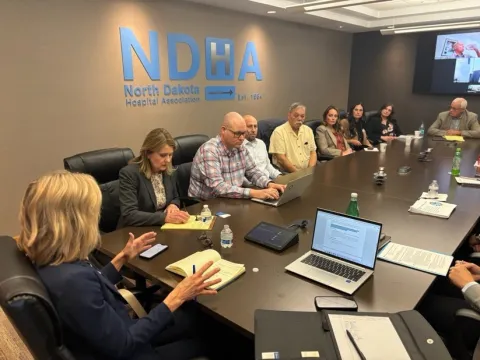Fedorchak hosts health care roundtable to discuss rural health investments under Working Families Tax Cuts Act
Bismarck, ND — Congresswoman Julie Fedorchak (R-ND) brought together state and industry leaders for a roundtable discussion this week focused on rural health care investments and ongoing Republican-led efforts to address the affordability of health insurance premiums.
“The Working Families Tax Cut Act established the Rural Health Transformation Fund, a landmark $50B investment in rural health care for states like North Dakota. The Centers for Medicare & Medicaid Services launched the application for states to apply for this new funding less than a month ago, and I’m proud our state’s health leaders quickly developed a thoughtful application,” Fedorchak said. “The forward-looking approach and collaboration among our hospitals, clinics, and state agencies should serve as a model for the entire country.”

The roundtable focused on the state’s innovative approach to the $50 billion Rural Health Transformation Fund passed under the Working Families Tax Cuts Act, the need for long-term health care reform, and addressing the COVID-era enhanced premium tax credits set to expire on January 1, 2026.
Fedorchak emphasized the difference between the long-standing Obamacare premium tax credits, which will continue to exist after January 1, 2026, and the temporary enhanced version created in response to the COVID-19 pandemic. The enhanced premium tax credits dramatically expanded eligibility and cost taxpayers billions each year.
“These tax credits were never meant to be permanent—that’s why Congressional Democrats themselves set them to expire on January 1, 2026. Republicans are ready to find a responsible path forward as soon as Democrats vote to reopen the federal government. Tying government funding to these enhanced premium tax credits is a red herring, and the longer Democrats keep the government shut down, the longer it delays a solution,” Fedorchak added.
She also expressed concern over the Democrat-supported Continuing Resolution, which would wipe out the $50 billion Rural Health Transformation Fund and roll back key health care reforms passed under the Working Families Tax Cuts Act. Specifically, to reopen the federal government, Democrats are demanding a $1.5T spending increase that would:
Remove the modest 20-hour per week work requirements established in the Working Families Tax Cuts for able-bodied, working-age adults on Medicaid
Restore taxpayer-funded free healthcare for illegal aliens.
Eliminate eligibility testing and safeguards to root out waste, fraud, and abuse in the Medicaid program.
Restore the Biden administration’s one-size-fits-all minimum staffing mandate for nursing homes that would have forced many rural North Dakota nursing homes to close
Repeal the $50 billion Rural Health Transformation Fund, hurting hospitals and clinics in rural communities
Participants included:
North Dakota Medicaid Director Sarah Aker
House Majority Leader Mike Lefor
State Representative Jon Nelson
State Representative Robin Weisz
State Senator Dick Dever
Todd Schaffer, Sanford Health
Reed Reyman, CHI St. Alexius Health
Andrew Askew, Essentia Health
Melissa Hauer, North Dakota Hospital Association
Nikki Wegner, North Dakota Long Term Care Association
Ben Bucher, North Dakota Center for Rural Health
Megan Houn, Blue Cross Blue Shield of North Dakota
Shannon Bacon, Senior Health Equity & Partnerships Manager at CHAD
Matt Fischer, Chief Director of Insurance Regulation
Courtney Koebele, Executive Director of the North Dakota Medical Association
John Arnold, Deputy Insurance Commissioner